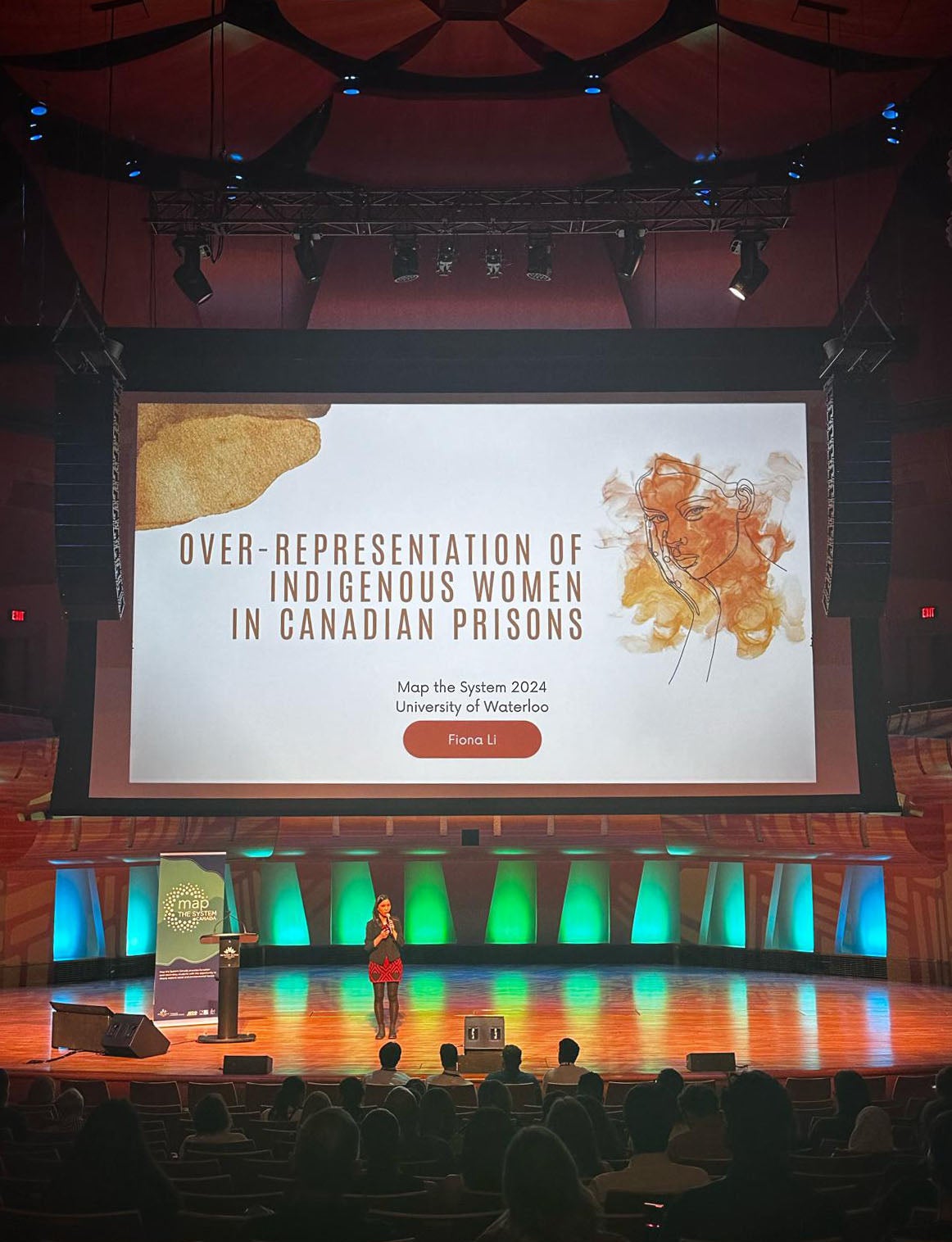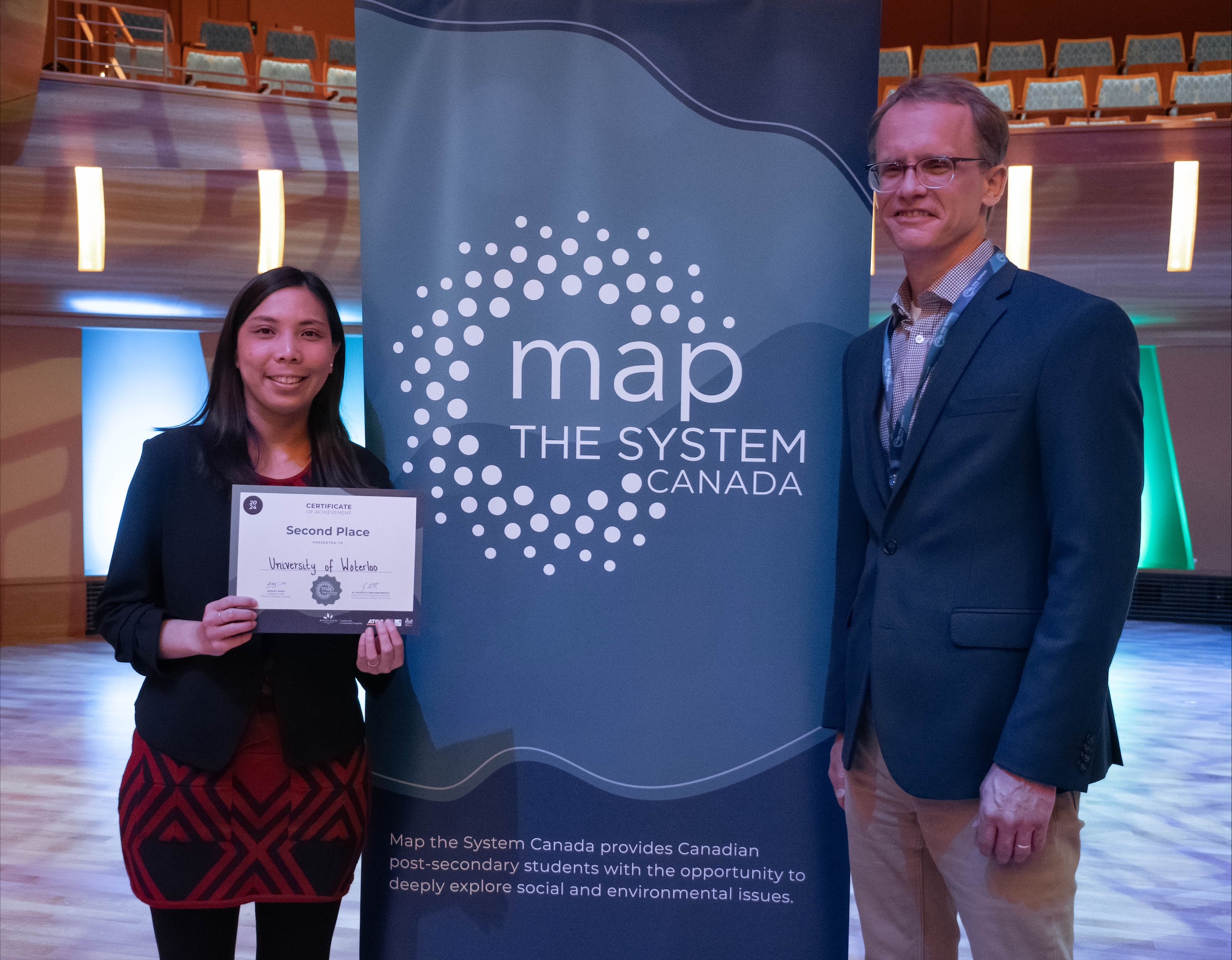Fiona Li – Mapping Actionable Change
On May 27, Fiona Li earned the second-place prize at the Map the System Canada competition in Calgary, Alberta. As the winner of the University of Waterloo’s Map the System campus finals, Fiona’s achievement on the national stage not only brought awareness to the over-representation of Indigenous women in Canadian prisons, but it also highlighted how programs like Peace and Conflict Studies are crucial in furthering education on how to research, understand, and present these critical issues.
Fiona, a Master of Peace and Conflict Studies student at Conrad Grebel University College and the University of Waterloo, first learned about the competition through Paul Heidebrecht, Director of the Kindred Credit Union Centre for Peace Advancement. This was the sixth year that the Centre has organized UWaterloo's participation in Map the System, with students from all six faculties and years of study participating from undergrad to postdoc. “Paul came to one of our classes and told us about it,” Fiona recalled. She felt that this was a significant opportunity because “using a system thinking approach to map out a complex issue would be a great skill to practice.”

Shortly thereafter, the Centre hosted an event in partnership with GreenHouse at United College where community organizations presented challenges they hoped students could “map out.” When Fiona heard the presentation by Scott Morton Ninomiya, Mennonite Central Committee Ontario’s (MCCO) Indigenous Neighbours Program Coordinator, discussing the challenge of addressing the mass incarceration of Indigenous women in Canada, it immediately caught her attention. She then worked on the project in collaboration with MCCO, a long-term partner of the Centre for Peace Advancement. “I was already interested in promoting restorative justice practices in prisons and the ongoing reconciliation work in Canada. The project put these two topics together,” she stated.
Reflecting on the process of her project, Fiona is grateful for the mentorship and support from both Scott at MCCO and Paul at the Centre. In the preparation for the campus finals, Fiona noted, “Partnering with MCCO has allowed me to ground the research in the first-hand experiences of Indigenous organizations and community partners who work closely on the challenge. Despite being a non-Indigenous newcomer, the interviews certainly strengthened my perspectives on the problems and the research.” Upon winning the campus finals, Fiona also benefited from Paul’s support to quickly refine the research for the national finals, including further connections that were instrumental to deepening her research with Indigenous knowledge, and a rehearsal at one of Centre for Peace Advancement’s weekly coffee breaks to get feedback from academics and organizations working there. “I definitely felt much more prepared for the national finals through MCCO and the Centre’s ongoing mentoring, and with Scott and Paul’s support throughout the entire process,” she added.

Fiona has continued her collaboration with MCC and began working on some of the pragmatic entry points for change they found through her analysis, as she started an MPACS internship placement with MCC at the beginning of May. “During the research phase, there were times that I came across stories that I was just so appalled by – I didn’t even get the chance to talk about them in the presentation itself, and I just feel like people need to know about this,” Fiona said. She added, “There are already Indigenous organizations and other non-profits and initiatives focusing on healing work and supporting those inside prisons, and the next step is to continue the discussions to find synergies and understand what more we can be doing locally. This is especially important when the Indigenous population in female prisons in Canada have surpassed 50% even though they only make up 5% of the adult female population, and the largest female federal prison – the Grand Valley Institution for Women (GVI) – is based here in Kitchener and people don’t necessarily know about it."
Putting into practice the theories learned in her MPACS courses on how to pursue justice, Fiona’s plan is to collaborate with community partners to strengthen “upstream” solutions that would prevent Indigenous women from going down the prison pipeline. She will also search for ways to promote awareness through education and effective advocacy with MCCO with the hope to mobilize the knowledge and get more people on board in recognizing the need to transform systems that are perpetuating these issues. Fiona will have access to $10,000 in "Apprenticing with the Problem" funding from Map the System Canada to support this ongoing work.
Fiona’s experience in the MPACS program has added to her understanding of oppression and discrimination from a systemic perspective, and she is keen to continue working on transforming the carceral system going forward. When asked how it felt to reach such a tremendous milestone, Fiona stated, “It started as research I took on to expand my learning, but I'm glad that I was able to have the stage to share about this injustice with more people through the competition Finals.” She hopes that through projects like her own, people can be mobilized to take action, because "talking is not enough."
By Natasha Forth